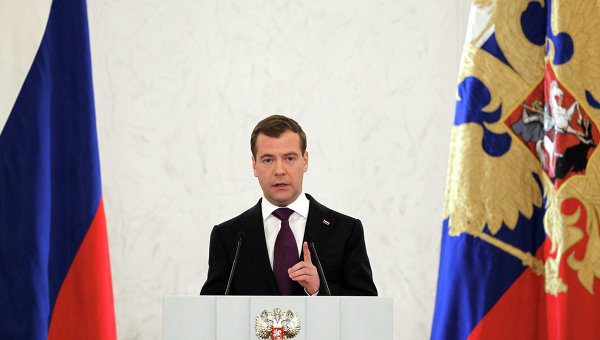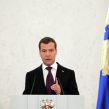
Corruption Rules in Russia Despite Medvedev’s Exorcism
Publication: Eurasia Daily Monitor Volume: 8 Issue: 11
By:

Russian President Dmitry Medvedev started the year that will decide his political fate by reviving his campaign against corruption, and on January 13 he chaired a meeting of the Anti-Corruption Council. Medvedev opened the proceedings with the half-hearted admission that “our successes in this sphere have been limited.” No analysis of the scope and root causes of the problem was produced, but the assembled bosses of every law enforcement agency duly reported on the modest but statistically significant increases in the numbers of investigations and court verdicts. Medvedev called for more “painstaking daily work,” took credit for the improvement of anti-corruption legislation, and was not particularly upset by the undeniable fact that “we have plenty of useful institutions that are not working at all.” Medvedev’s intention was to demonstrate his resolution in addressing this “fundamental task,” which in his list presented in the address to the parliament last November was reduced to number seven.
Medvedev duly made a few headlines, but hardly scored any points with target audiences who are exposed to this social ill in different ways yet have few doubts about its malignant growth (Rossiyskaya Gazeta, Nezavisimaya Gazeta, January 14). For Western observers and potential investors, it is Russia’s incessant slide to the very bottom of the “Corruption Perception Index” compiled by Transparency International that constitutes the clearest evidence of the all-penetrating rot (Vedomosti, December 30). Perceptions are certainly not scientific proof, but many other indexes provide corroborating evidence: for instance, in the “Political Risk Atlas” published by Maplecroft last week, Russia is listed as one of the ten most risky states together with Afghanistan, Iraq, Pakistan, and North Korea (Kommersant, January 13). The “Economic Freedom Index” is only marginally better, awarding Russia 143rd place out of 179 (RBC Daily, January 13). Methodologies behind these indices may be imperfect, but the massive exodus of capital from Russia is estimated to reach $38.5 billion in 2010, twice higher than the worst forecast by the Central Bank, which proves that Russian entrepreneurs find it prudent to take their business elsewhere (Nezavisimaya Gazeta, January 14).
The Russians are indeed less concerned about international rankings but more attentive to several high-profile corruption stories that are developing in the increasingly aggressive blogosphere. One of these involves state-owned Transneft, which according to documents published by investigative lawyer, Aleksei Navalny, and opposition politician, Vladimir Milov, vastly exceed the usual kickback margin in the recently completed construction of the East Siberia-Pacific Ocean oil pipeline (Ekho Moskvy, Moskovsky Komsomolets, January 14). Prime Minister, Vladimir Putin, has ensured that Transneft is off limits and its former CEO, Semyon Vainshtok, was allowed to depart quietly to Israel on a “golden parachute.” Nobody in Russia is shocked by the WikiLeaks revelations about deep corruption in Gazprom, but there have been expectations that the scandalous sacking of the Moscow Mayor, Yuri Luzhkov, would lead to the cleansing of his Augean Stables (Vedomosti, January 11). Luzhkov, however, has wisely chosen to swallow his grievances, and the investigation of the loans provided by the Bank Moskvy (owned by the Moscow government) to Inteko (owned by his wife Elena Baturina) has been discreetly discontinued (Kommersant, January 13).
This benevolence to mega-corruption in the top layer of new nomenklatura stands in striking contrast to the severe verdict in the crudely falsified case against Mikhail Khodorkovsky and Platon Lebedev that shocked many closeted liberals. Medvedev tries to negate this impression by demanding a thorough check on the income declarations submitted by all high-level officials and their family members (Kommersant, January 14). There are, nevertheless, no signs of panic in the bureaucracy where this campaign is interpreted as an attempt to gather a dirty dossier (called in modern Russian kompromat) on each member of this class and thus to gain a lever for controlling it. Their indifference is informed by the well-formed disdainful opinion about Medvedev’s ability to make and execute decisions, but even Putin now has serious problems in controlling the self-serving bureaucratic machine (www.gazeta.ru, January 11). Putin may pretend to be in charge of the rescue operation in the Sea of Okhotsk, but in fact it is directed through the bargaining between the company owning the fishing fleet and the company that owns the ice-breakers (Ezhednevny Zhurnal, January 14).
Russia’s rich-and-powerful would not be impressed by yet another rhetorical salvo in the feigned war against corruption, but they are concerned about the outrage among the “have-nots,” fuelled by the unverifiable but irrefutable information circulating through millions of blogs. The palaces outside Moscow and Sochi that have caught the attention of bloggers are abandoned by their anonymous owners (Vedomosti, January 11). Moscow is becoming far less of an arrogant “in-your-face” megapolis of wealth and luxury and the glamorous life-style in its clubs and salons is distinctly toned down. Even the famous Russian week in the Courchevel ski resort in the French Alps that was once a carnival of crazy money was this year a rather subdued affair (www.gazeta.ru, January 13).
This superficial moderation of extravaganza does not change the fundamental fact that corruption in Russia keeps growing, while the economic performance worsens. The federal budget is in the red, petro-rent is shrinking due to rising costs of production, margins of profit in banking are narrowing because inflation runs high, which means that there is less wealth available for stealing –but the appetites in the bureaucracy cannot be reduced. Putin announced the plan to cut the number of government staff members by 5 percent, but experience shows that every attempt to trim the enormous army of bureaucrats only adds to its incessant growth. Medvedev’s pet-project to build a “wonder-city” in Skolkovo outside Moscow as a driver of his “modernization” strategy is in fact just another golden opportunity for embezzlement, because behind every Potemkin village there is always a “black hole” of corruption (www.polit.ru, January 12).
The sudden collapse of the deeply corrupt regime in Tunisia is instantly interpreted by dozens of Russian bloggers as a sign of things to come (www.besttoday.ru, January 16). The brutal suppression of opposition after the elections in Belarus last month was seen by many Russians as another possible future. Neither option looks appealing, but the system of governance that is still approved by the majority has simply stolen its own future.




